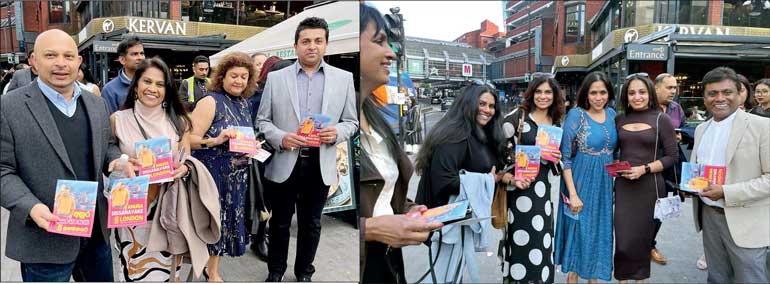Saturday Feb 14, 2026
Saturday Feb 14, 2026
Friday, 2 August 2024 00:22 - - {{hitsCtrl.values.hits}}

The expat voting rights issue in Sri Lanka has not gained the momentum it deserves
 Context
Context
The Gazette for Presidential Elections 2024 has been published and the political actors are busy in preparations for nominations, negotiations, making strategies for winning the election and campaigning. Businesses are looking for supporting their most favourable candidate. Political analysts are busy in listing their wish lists and few predicting who might win or lose. Journalists are having field days, getting busy promoting their perspectives of the prospective candidate(s). The public are getting ready for the mega entertainment without properly understanding impact/implications their vote may lead to the future of this nation. These are all necessities for reminding us that Sri Lanka is a democratic nation.
Everyone is getting busy to play their role(s). However, a very large segment of the Sri Lankan population who are primarily living overseas to bring food and a better living condition for their families and loved ones in Sri Lanka are denied their voting franchise. In a majority of the cases, such worker migrations are not necessarily a choice but rather imposed due to the economic situation back in Sri Lanka. During the economic disaster we faced, the expat’s contribution by way of foreign exchange not only assisted to salvage the economy, but it also continues to assist in the long-term prosperity of the Sri Lankan nation.
A million dollar question to ask is why the fundamental and basic rights of migrant workers are continued to be denied.
Statistics
As per the Central Bank available statistics the total population of Sri Lanka is 22.2 million (2023). Out of which app 16.8 million (2023 – Election Commission Data) are registered voters.
Among these registered voters, app 2.0-2.5 million are migrant workers. (Note: Author is unable to obtain accurate statistics of cumulative net migrant population of Sri Lankans with Sri Lankan or Dual citizenship). As such we can expect 12.5 to 15% of eligible voters are denied their universal franchise simply because they have (temporarily) migrated to other countries for the purpose of employment, education, or other reasons.
Universal franchise and elections
It is the right of all qualified citizens, irrespective of their race, religion, language, ethnicity, caste, education, ownership of wealth, birth, the place of birth, gender or any other difference, to participate in the administration of the country and/or to elect their representatives. That is, the universal franchise confers sovereignty in the people. In other words, the right of taking decisions about himself or herself and about the county, is vested with the citizen. In monarchical systems of governments, the decision marker on these aspects, was the king. The foundation of the republics based on democratic principles after changing monarchisms, was the universal franchise. The bridge for the people to join with public administration is the universal franchise. (Refer https://elections.gov.lk/en/aboutus/aboutus_elections_E.html).
Historical perspectives
The quest for the expat voter rights issue has a long history in the world. Some countries have given voting rights for soldiers which goes way back to 1862 (USA) and 1918 (UK) (refer https://en.wikipedia.org/wiki/Non-resident_citizen_voting). In due course this rights were extended to public. As of today, there are more that 141 (or 120) countries (depending on the different sources) that allow various degrees of voting rights for their citizens living in the overseas territories. Unfortunately, in the SAARC region we do not have exemplary examples for expat voter rights. Pakistan offered the voting rights but reversed in 2022 (refer https://www.arabnews.pk/node/2439651/pakistan). India does allow Non-Resident Indian (NRI) voting rights albeit with many restriction (refer https://www.indiainfoline.com/knowledge-center/share-market/can-non-resident-indians-nris-cast-their-vote-in-india).
The East Asian countries (Singapore, Malaysia, Philippines, etc.) do allow the expat voting rights.
Sri Lankan context
There were few attempts in the past by various individuals/organisations to highlight the need for expat voting rights. A selected list (neither comprehensive nor complete) is listed below to acknowledge their voices and efforts in this regard:
Chandani Kirinde and Laila Nasry reported in Dec. 2001, the plights of how expats were “Barred from the Ballot” (refer https://www.sundaytimes.lk/011202/plusm.html)
Shereen Saroor published an article titled “Advocating for the Voting Rights of Sri Lankan Migrant Workers” in 2003 and highlighted that “In 2000, a migrant NGO started the campaign to extend voting rights to migrant workers as a means to improve their leverage to influence policy making. The campaign has gained the support of different political parties and government agencies” (refer:https://www.researchgate.net/publication/273313371_Advocating_for_the_Voting_Rights_of_Sri_Lankan_Migrant_Workers)
National Workers Congress past secretary Anton Lodwick was urging to consider voting rights for migrant workers for Jan. 26 Poll, 2010. (Refer Voting rights urged for migrant workers, other Sri Lankan residents overseas (sundaytimes.lk))
Former Election Commissioner Mahinda Deshapriya indicated in 2016 that “Elections commission is keen to ensure millions of Sri Lankans living abroad are granted voting rights making the electoral process more inclusive” (refer Sri Lanka mulls voting for citizens abroad | EconomyNext, Voting rights for expat Lankans in the offing | Arab News, Sri Lankan expats hopeful of voting rights in home country – Times of Oman).
Sunil Handunnetti (ex-MP and Chairman of COPF) during his visit to KSA (in 2017) told Arab News that the country’s expatriates should be given voting rights (refer Legislator urges voting rights for Sri Lankans back home | Arab News). On another occasion he urged the Government to provide a pension plan and voting right for all Sri Lankan foreign workers, collected signatures of Sri Lankan expatriates and lodged a petition from each Middle East country including Qatar, Kuwait, Oman and Saudi Arabia. (Refer https://www.ft.lk/News/jvp-calls-for-pension-and-voting-rights-for-sri-lankan-expatriate-workers/56-492043). However, it is regretted to note that JVP/NPP appears to no longer pursue this rights issue or at least no longer a priority since they are focusing on the presidential campaign.
Francis Solomontine reported in Dec. 2021 that “The Sri Lankan Government maintains its silence on Sri Lankan expatriates demanding voting rights” (refer Are Sri Lankan expatriates’ rights harmonised for country’s economic interest? | Daily FT).
A parliamentary select committee (2021) for electoral reform made recommendations for expat voting rights but unfortunately no action taken thus far. (Refer Parliament of Sri Lanka - News - The Final Report of the Select Committee of Parliament to Identify Appropriate Reforms of the Election Laws and the Electoral System and to Recommend Necessary Amendments presented to Parliament).
Special Presidential Commission (2023) was required (among other issues) to “examine all existing election laws and regulations and make necessary recommendations” to amend election laws to suit current needs. It has been called upon to give “special consideration” to: Provide an opportunity for electronic voting by Sri Lankans (living) overseas. Unfortunately, no final report available in the public domain, nor tangible actions taken to facilitate the expat voting rights.
Online petitions were initiated by Ruwan Subasinghe (refer https://www.ipetitions.com/petition/srilankaexpatvote/), Susantha Ranatunga (https://www.change.org/p/election-commission-of-sri-lanka-voting-rights-of-expat-sri-lankans-should-be-ensured-for-upcoming-election 2020), and in 2024 by Dr. Chanaka Senanayke (https://www.change.org/p/implement-a-voting-system-for-overseas-sri-lankans). However, it is regretful to note that these online petition were not supported “enmasse” by the stakeholders.
Sulochana Ramiah Mohan in a recent article titled “Allowing Expats to Exercise Franchise Vital” highlighted the need for expat voting rights highlighting how Maldivian expats living in Sri Lanka were allowed to vote and the Sri Lankan expats (in Maldives and elsewhere) were discriminated (https://ceylontoday.lk/2024/01/13/allowing-expats-to-exercise-franchise-vital/).
Status quo
Despite many of the above listed and other efforts, the expat voting rights issue in Sri Lanka has not gained the momentum it deserves. It is an irony that like many other rights issues, the expat voters’ rights issue was never popular nor given the importance it deserves by the so called “Rights Organisations”, “Election Monitoring NGOs”, “Political Parties” “Election Commission” or even political pandits.
While an “Overseas Voters Registration-Testing” is provided in the Election Commission website (refer https://eservices.elections.gov.lk/pages/index_ct.aspx), the facility is only at preliminary testing stage and may not be implemented for forthcoming Presidential/ Parliamentary Elections.
People’s Action for Free and Fair Elections (PAFFREL) Executive Director Rohana Hettiarachchi reveals that his organisation has been lobbying for a voting system for Sri Lankans overseas for the past decade; however, there has been no progress but now there is growing interest in its implementation. Hettiarachchi told that the introduction of overseas voting might not occur in the upcoming elections (neither in the current polls scheduled for this year nor the next year) (https://ceylontoday.lk/2024/01/13/allowing-expats-to-exercise-franchise-vital/).
Implications of denying voting rights for expats
It is an irony that the consecutive Governments always expect the expat community to invest and support the Sri Lankan economy. Except those who have obtained citizenship or permanent residency abroad, the majority of the migrant worker communities maintain the Sri Lankan citizenship and send their hard-earned money back to Sri Lanka. Therefore, the expat voting issue is a fundamental rights issue that needs urgent attention. As much as they contribute to the economy, they should have the right to vote wherever they are currently domiciled.
Considering the very high percentage of the migrant workers (12.5 to 15%), the impact of availing the expat voters’ right has very direct implication on the selection of the President or their representatives.
Further actions needed
It is the right time for all the political scientists/commentators/analysts and influencers to give prominence to this issue. A kind request to all parliamentarians to raise this issue consistently to change the provisions of election act and to enforce the Election Authority to avail expat voting rights beyond the preliminary testing stage. Elections Commission to verify how it could accommodates this fundamental right with existing/future law. I also request that interested stakeholders sought remedies through public litigation to collectively win the fundamental rights of migrant workers who are unable to travel back to Sri Lanka exclusively for the purpose of exercising their franchise. If only a portion of the travelling cost by a few thousand (or is it in lacks??) expats is spent on vigorously promoting the voting franchise, this would improve our democratic values and universal franchise without discrimination for the migrant workers.
(The writer is a migrant worker for the last three decades and advocates for expat rights. The opinions are his personal unless quoted with references. He can be contacted through email: [email protected].)